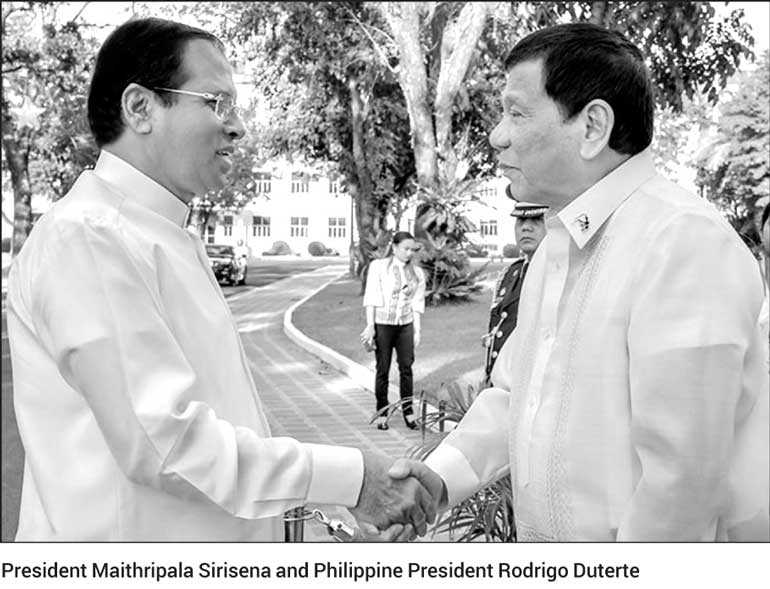Tuesday Feb 24, 2026
Tuesday Feb 24, 2026
Saturday, 26 January 2019 00:10 - - {{hitsCtrl.values.hits}}

By Natasha Fernando
Sri Lanka and Philippine diplomatic relations dates back to 1961 with bilateral visits and discussion on cooperation spanning cultural affairs, visa and taxation requirements for Philippine workers in Sri Lanka, trade and air transport. The first official head of state visit occurred in 1976 when Sirima Bandaranaike visited Manila as Prime Minister.
Philippines is the current chair of the ASEAN, and a key player in the Southeast Asia region. The recent visit of president Sirisena to the Philippines paved the way for discussion on five MOUs reportedly on education, tourism, agricultural and economic cooperation, and MOU on defence cooperation. The content of the latter includes: military education, training, exchanges of defence and military delegations, etc.
The media reported on several occasions even prior to the official State visit that Sri Lanka aspires to replicate the Philippine war on drugs which are calculated statements (irrespective of the truth or with little truth to them) triggering a contentious debate on Sri Lankan aspirations for control of drug trafficking.
The problem of drug trafficking in Sri Lanka
The Australian Strategic Policy Institute identifies “heroin trafficked through Sri Lanka originates mainly in the ‘Golden Crescent’ area of Central and South Asia via fishing boats from southern India across the Palk Strait to the west coast of Sri Lanka” (Mannar, Kalpitiya, Negombo and Mullaitivu).
According to UNDOC South Asia Regional Profile 2005, “The most significant drug problem is the trafficking of heroin from India for local consumption.” Sri Lanka serves as a transhipment hub for heroin as indicated by India’s NCB which also states Sri Lanka coastguard has limited interdiction capacity due to the vast length of this trafficking route.
In 2016, a consignment of 101 kg of heroin trafficked by 11 individuals were apprehended by the Navy in the southern coastal belt along with the Police Narcotics Bureau in compliance with President Maithripala Sirisena’s policy for ‘A Country without Drugs’.
The Special Task Force, Navy and Police Narcotics Bureau have been quintessential to the confrontation of the drug issue in Sri Lanka. The President’s controversial decision to grant Police powers to the armed forces to control drugs surfaced news portals in mid-2018 causing a general stir. This was opposed by academia, human rights activists and a number of civil society organisations and think tanks in Sri Lanka.
At the individual level, President Sirisena’s ‘rhetoric’ on suppressing drug issues in ‘Duterte style’ may have been a response to criticisms against his leadership in the past year. There is a perception among certain factions in society that Sirisena is not a ‘strong man leader’ and Sri Lanka needs a leader with ‘Hitler-like determination’.
President Duterte himself has made the following statement about his leadership for Philippines: “Hitler massacred three million Jews … there’s three million drug addicts. There are. I’d be happy to slaughter them.”
In the Sri Lankan context however, President Sirisena is unfortunately ill-advised on how to tackle the criticisms levelled against him and the decisions he should make pertaining the issue of drug trafficking and drug abuse in Sri Lanka.
The controversial Philippine war on drugs
The UN Office on Drugs and Crime has stated the Philippines as the world’s highest user of crystal methamphetamine. Duterte’s Government was pressurised to take action against this but with arbitrary use of state security sector through the war on drugs. This became an international concern due to human rights abuses.
The Philippine Police have also been implicated in extra-judicial killings in their attempts to eradicate drug abuse. It is also opined the government surveys on ‘drug addicts’ , ‘drug abusers’ and drug users’ are methodologically flawed which has resulted in conflicting reports of numbers on drug users and the reported reductions of such use.
The stigmatisation of drug addicts and Duterte’s opinion that rehabilitation is not an option has caused a massive humanitarian issue with societal implications that goes beyond the erosion of social capital.
This approach is blatantly flawed, which makes any state leader praising such an approach look bad in the eyes of an educated public. President Duterte during Sirisena’s visit has stated: “The Philippines and Sri Lanka are developing maritime nations. We face common challenges, we have shared interests.”
This statement has two sides to it. It is true that both nations are developing countries trying to improve respective economies and ensure national security. While both nations are facing a drug problem, the security concerns are hugely different: the Philippines is grappling with the control of an armed communist group among other terrorist and insurgent movements engaged in organised crimes of nuanced and complex detail. The war on drugs is considered auxiliary to curb these movements as well.
How should Sri Lanka move forward?
The situation in Sri Lanka is manifestly different given we do not have such terrorist or insurgent movement but a ‘drug problem’. This problem includes trafficking, illegal sale and consumption of narcotics and its abuse.
Control and eradication of this problem requires a drug control policy that encompasses an exhaustive definition of drug abuse, while also strengthening psycho social support services. The deterrence for drug abuse should take into consideration the dismantling of organised crime of trafficking from various sources.
These sources may include: preventing Sri Lanka from being used as a transhipment hub for drug trafficking, seizure and arrest of drug mules through the customs, instead of only targeting and stigmatising drug addicts or abusers. The confusion in the terminology would result in dangerous implications for society at large.
President Sirisena, who remains a good man at heart, is seemingly ill-advised on tackling a contemporary concern of modern society which requires comprehensive study and comprehensive solutions.
(The writer is a Research Assistant at the Institute of National Security Studies Sri Lanka.)